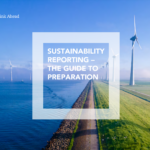The organisation representing the CFOs of Australias leading enterprises, the Group of 100, today released a guide which addresses many of the questions its members and senior executives in corporate Australia raise about triple bottom line (TBL) reporting.
Prepared by a Working Party of the G100 led by Garry Fowler, of Ernst & Young, Melbourne, the guide sets out to explain the concepts and issues associated with this reporting practice.
TBL is assuming greater prominence on the agendas of many Australian businesses as well as on the agendas of public sector, business and professional bodies including the BCA, the Australian Institute of Company Directors, CPA Australia and The Institute of Chartered Accountants in Australia.
The move towards greater transparency and accountability in public reporting is a means of meeting the broadening needs of stakeholders and the community for information on corporate performance in managing the environmental, social and economic dimensions (TBL) of an entitys activities, said John Stanhope, National President of the Group of 100.
The community is increasingly demanding information from companies regarding their approach to managing the environmental and social impacts of their activities.
The CFOs of many enterprises are often in the front line when it comes to responding to such demands requiring them to prepare or overview TBL disclosures as well as identifying any risks or financial impacts associated with TBL reporting.
In preparing the Guide the Working Party identified a number of business benefits which flow from TBL. These include:
enhanced corporate reputation and brand benefit
securing and maintaining a social licence to operate
reduced risk profile
attraction and retention of high calibre employees
aligning stakeholder needs with management focus, and
improved access to the investor market
With the increased focus on governance, risk management and internal controls stakeholders are placing increased emphasis on obtaining a broader perspective on the overall economic impact of the activities of companies. The Working Party identifies a number of factors which are driving this shift in public reporting not least of which is the communitys general desire to better understand the approach companies are taking to managing the environmental and social impacts of their activities.
We do not view the Guide as prescriptive. It acknowledges that TBL is a journey the form of which will depend on the objectives and the strategies of particular companies, said John Stanhope.
We do however view it as a window into TBL. Something which will clarify issues relating to this form of reporting and provide cut through and an easy reference for senior management in Australian companies considering how to address this subject.
Already in Australia a number of major corporates such as Westpac, BHP Billiton, BP Australia and WMC Resources are engaging successfully with their stakeholders in this process.
Finally, the decision to undertake TBL is to embark on a journey.
Once commenced it is difficult to turn back and the approach adopted by a company today is unlikely to be the same as that adopted in future years.



